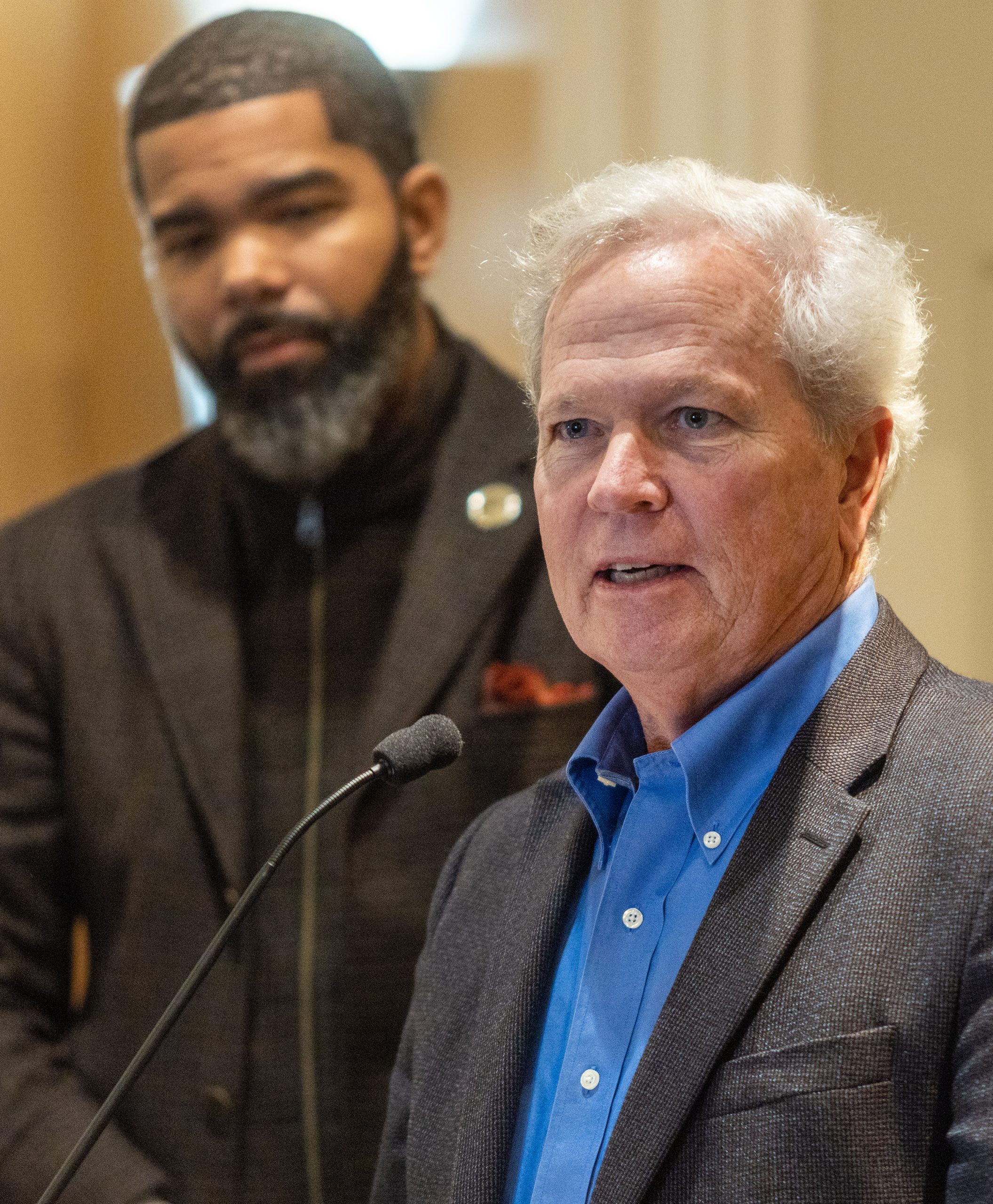Mississippi Today
Jackson lawmakers ‘shocked’ after Henifin backs bill depleting local power

Just over a year into his uniquely powerful role reviving Jackson’s water infrastructure, third-party manager Ted Henifin is supporting an effort to leave the city without any future control of its water and sewer assets.
Sen. David Parker, R-Olive Branch, authored Senate Bill 2628, a renewed attempt to place the capital city’s water and sewer infrastructure under the control of a “Capitol Region Utility Authority.” The measure passed out of its Senate committee last week.
Parker in last year’s session filed a similar bill, which Henifin, along with Jackson’s legislative delegation and city officials, criticized as a power grab by the state. That bill failed in the House.
But in a Feb. 23 press release, Henifin seemingly flipped his narrative on the state’s efforts by giving his support for SB 2628.
“After reviewing SB 2628, I believe this is a great foundation,” Henifin said in a Feb. 23 press release. “It appears that many of the comments I provided during the last session regarding the bill introduced in 2023 were taken to heart and this bill now includes many of the suggestions I made at that time.”
Empowered by U.S. District Judge Henry Wingate, Henifin’s primary role is to use about $800 million in federal funding to stabilize Jackson’s water and, as of last fall, sewer systems. But the 2022 court order that hired Henifin also asked him to suggest a future governance structure for the water system after his time in charge ends.
While Henifin has yet to make an official recommendation to the court, he last year brought up an idea of creating a corporate nonprofit, similar to what’s proposed in SB 2628, but also keeping ownership of the water assets with the city.
While the two versions of the Parker bill are largely similar, the 2024 version strips all power from Jackson city officials to have any say in how their water and sewer systems are run. In the 2023 measure, the newly created utility authority would be governed by a nine-person board. Five appointees would have came from the governor and lieutenant governor, outnumbering the four that would have came from the mayor of Jackson.
While that version left the city with a minority of the board appointments, the 2024 measure goes even further: SB 2628 would give five appointees to the governor, and the remaining four to the lieutenant governor. That would leave who controls a city service in a majority Black, largely Democratic city in the hands of two white Republicans.
Mississippi Today reached out to Henifin asking whether he had any concern with the lack of local power being proposed in the Parker bill. The third-party manager responded via e-mail that he has “no dog in the appointment fight.”
“I am agnostic as to who appoints the board,” Henifin said. “The important thing to me is the board seats remain as defined along with the various requirements of all board members — ratepayers connected to the system, no elected officials, etc.”
But state officials representing Jackson were far from pleased with his support of the bill.
Sen. John Horhn, D-Jackson, told Mississippi Today that no one from the Jackson delegation even knew about Parker’s bill until it was introduced at last week’s Senate committee meeting. Horhn also said he met with Henifin earlier this week.
“We met with Mr. Henifin this week to express our dismay with the position that we’ve been put into by his comments,” Horhn said, explaining that Henifin’s support of the bill gives its proponents extra ammunition to argue for it.
On top of the city having no elected officials in charge of the proposed authority, the bill would also allow the authority to purchase the physical assets from Jackson at a “fair market value,” as determined by the federal court.
“It’s disrespectful,” Rep. Chris Bell, D-Jackson, said of the bill. “I’m going to do everything I can to try to kill the bill on (the House’s) side if it gets here.”
Bell explained that the bill would “dilute” the power of Jackson residents in governing their own utilities. The position from Henifin, who has emphasized building trust with residents as a key to his success, left Bell shocked, he added.
“I was shocked, dismayed, and really left speechless,” the lawmaker said. “That’s what I’m more disappointed about than anything, is before he made those statements he should have talked to the (Jackson) delegation first.”
Horhn added that the repeated attempts by the state to remove power from Jackson officials begs the question: Why have a city government in the first place?
“We saw it with the airport, we saw it with the 1% sales tax, we saw it with the Capitol Complex Improvement District, we saw it with the Capitol Police, and we’re seeing it now with the water and wastewater,” Horhn said. “At some point, the city of Jackson won’t have any governing it’ll be doing at all.”
Under SB 2628, the city’s water, wastewater and storm water systems would be governed by the nine-person board, which would consult with the federal court to pick a president that would handle administrative tasks, such as hiring personnel, dealing with the infrastructure. The president would work “at the will and pleasure of the board.”
The governor’s five board appointees would have to include:
- one employee of a large nonhealthcare business with at least 200 employees working within the service area.
- an owner of a restaurant in the service area.
- an employee of a nonprofit within the service area.
- a member of the clergy leading a place of worship within the service area.
- and an at-large appointee who lives or works in the service area.
The lieutenant governor’s four appointees must include:
- a small business owner whose primary location is in the service area.
- an employee of a large health care facility in the service area.
- an employee of a post-secondary institution in the service area.
- and an at-large appointee who lives or works in the service area.
Henifin said there were a few changes to Parker’s proposal that earned his support this session: requiring the president to serve as the third-party manager’s deputy until Wingate relieves Henifin of his duties; maintaining Henifin and the court’s control of federal money received so far; adding specifications as to who can be on the board; and defining the authority’s customers as those connected to the Jackson systems as of July 1, 2024.
This article first appeared on Mississippi Today and is republished here under a Creative Commons license.![]()
Mississippi Today
On this day in 1873, La. courthouse scene of racial carnage
April 13, 1873

On Easter Sunday, after Reconstruction Republicans won the Louisiana governor’s race, a group of white Democrats vowed to “take back” the Grant Parish Courthouse from Republican leaders.
A group of more than 150 white men, including members of the Ku Klux Klan and the White League, attacked the courthouse with a cannon and rifles. The courthouse was defended by an all-Black state militia.
The death toll was staggering: Only three members of the White League died, but up to 150 Black men were killed. Of those, nearly half were killed in cold blood after they surrendered.
Historian Eric Foner called the Colfax Massacre “the bloodiest single instance of racial carnage in the Reconstruction era,” demonstrating “the lengths to which some opponents of Reconstruction would go to regain their accustomed authority.”
Congress castigated the violence as “deliberate, barbarous, cold-blooded murder.”
Although 97 members of the mob were accused, only nine went to trial. Federal prosecutors won convictions against three of the mob members, but the U.S. Supreme Court tossed out the convictions, helping to spell the end of Reconstruction in Louisiana.
A state historical marker said the event “marked the end of carpetbag misrule in the South,” and until recent years, the only local monument to the tragedy, a 12-foot tall obelisk, honored the three white men who died “fighting for white supremacy.”
In 2023, Colfax leaders unveiled a black granite memorial that listed the 57 men confirmed killed and the 35 confirmed wounded, with the actual death toll presumed much higher.
This article first appeared on Mississippi Today and is republished here under a Creative Commons Attribution-NoDerivatives 4.0 International License.![]()
Mississippi Today
Lawmakers used to fail passing a budget over policy disagreement. This year, they failed over childish bickering.
It is tough to determine the exact reason the Mississippi Legislature adjourned the 2025 session without a budget to fund state government, which will force lawmakers to return in special session to adopt a spending plan before the new fiscal year begins July 1.
In a nutshell, the breakdown seemed to have occurred when members of the Senate got angry at their House counterparts because they were not being nice to them. Or maybe vice versa.
Trying to suss this reasoning out is too difficult. The whole breakdown is confusing. It’s adolescent.
Perhaps there’s no point in trying to determine a reason. After all, when preteen children get mad at each other on the playground and start bickering, does it serve any purpose to ascertain who is right?
During a brief time early in the 2000s, when the state had the semblance of a true two-party system, the Legislature often had to extend the session or be called back in special session to finish work on the budget.
During those days, though, the Democrat-led House, the Republican-controlled Senate and the Republican governor were arguing about policy issues. There were often significant disagreements then over, say, how much money would be appropriated to the public schools or how Medicaid would be funded.
Now, with Republicans holding supermajorities over both the House and the Senate and a Republican in the Governor’s Mansion, the disagreements do not seem to rise to such legitimate policy levels.
It appears the necessity of a special session this summer is the result of House leaders not wanting to work on a weekend. And actually, that seemed like a reasonable request. It has always been a mystery why the Legislature could not impose earlier budget deadlines keeping lawmakers from having to work every year on a weekend near the end of the session.
But there were rumblings that if the House members did not want to work on the weekend, they should have been willing to begin budget negotiations with senators earlier in the session.
In fairness and to dig deeper, there also was speculation that the budget negotiations stalled because senators were angry that the House leadership was unwilling to work with them to fix mistakes in the Senate income tax bill. Instead of working to fix those mistakes in the landmark legislation, the House opted to send the error-riddled bill to the governor to be signed into law — because after all, the mistakes in the bill made it closer to the liking of the House leadership and Gov. Tate Reeves.
In addition, there was talk that House leaders were slowing budget negotiations by trying to leverage the Senate to pass a litany of bills ranging from allowing sports betting outside of casinos to increasing school vouchers to passing a traditional pet projects or “Christmas tree” bill.
The theory was that the House was mad that the Senate was balking on agreeing to pass the annual projects bill that spends state funds for a litany of local projects. For many legislators, particularly House members, their top priority each year is to bring funds home to their district for local projects, and not having a bill to do so was a dealbreaker for those rank-and-file House members.
To go another step further, some claimed senators were balking on the projects bill because of anger over the aforementioned tax bill. Another theory was that the Senate was fed up with House Ways and Means Chair Trey Lamar sneaking an inordinate number of projects in the massive bill for his home county of Tate.
But as stated earlier, does the reason for the legislative impasse really matter? The bottom line is that it appears that the reason for legislators not agreeing on a budget had nothing to do with the budget itself or disagreement over how much money to appropriate for vital state services.
House and Senate budget negotiators apparently did not even meet at the end of the session to fulfill the one task the Mississippi Constitution mandates the Legislature to fulfill: fund state government.
As a result, lawmakers will have to return to Jackson this summer in a costly special session not because of big policy issues, such as how to fund health care or how much money to plow into the public schools, but because “somebody done somebody wrong.”
Those big fights of previous years are less likely today because of the Republican Party grip on state government. The governor, the speaker and the lieutenant governor agree philosophically on most issues.
But in the democratic process, people who are like-minded can still have major disagreements that derail the legislative train — even if those disagreements are over something as simple as whether members are going to work during a weekend.
This article first appeared on Mississippi Today and is republished here under a Creative Commons Attribution-NoDerivatives 4.0 International License.
Mississippi Today
On this day in 1864, Confederates kill up to 300 in massacre
The post On this day in 1864, Confederates kill up to 300 in massacre appeared first on mississippitoday.org
-

 News from the South - Virginia News Feed7 days ago
News from the South - Virginia News Feed7 days agoTariffs spark backlash in Virginia over economic impact | Virginia
-

 News from the South - Kentucky News Feed6 days ago
News from the South - Kentucky News Feed6 days agoVersailles asked to conserve water, county steps in to help
-

 News from the South - Louisiana News Feed6 days ago
News from the South - Louisiana News Feed6 days agoNew Orleans police investigating hit-and-run crash in Seventh Ward; family says grandmother was hurt
-

 News from the South - Louisiana News Feed5 days ago
News from the South - Louisiana News Feed5 days agoCrime scene shocks St. Tammany Trace residents as sheriff's investigation continues
-

 News from the South - Florida News Feed6 days ago
News from the South - Florida News Feed6 days agoInvestigators continue search for Florida child missing since 2006
-

 News from the South - Missouri News Feed4 days ago
News from the South - Missouri News Feed4 days agoLocals react to Cara Spencer winning mayoral race
-

 News from the South - North Carolina News Feed4 days ago
News from the South - North Carolina News Feed4 days agoProposal: Farm property tax break on solar from 80% to zero | North Carolina
-

 News from the South - Arkansas News Feed4 days ago
News from the South - Arkansas News Feed4 days agoArkansas State Police launches new phone-free campaign















































